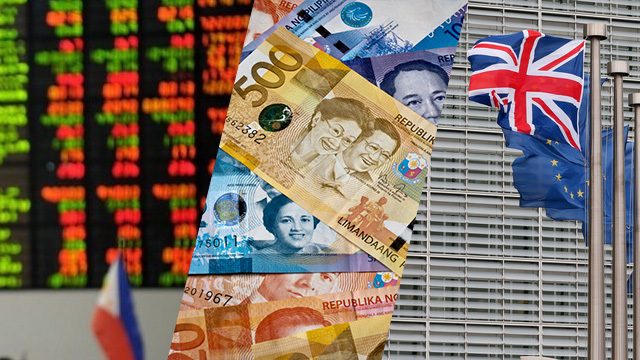SUMMARY
This is AI generated summarization, which may have errors. For context, always refer to the full article.

MANILA, Philippines – As the world continues to grapple with the fallout from the United Kingdom’s unprecedented vote to leave the European Union, the Philippines’ economic managers have stepped in to calm local nerves.
“The direct effect of Brexit does not seem substantial, even as we expect that domestic financial markets will experience volatility and huge swings in capital flows in the short term due to uncertainty. Despite this knee-jerk reaction, the economy stands on solid footing given its strong macroeconomic fundamentals,” said Socioeconomic Planning Secretary Emmanuel Esguerra in a statement on Tuesday, June 28.
In the immediate aftermath of the vote last Friday, June 24, the Philippine Stock Exchange Index (PSEi) fell by 1.29% to 7,629.72 while the peso weakened to P46.950 against the benchmark dollar.
On Tuesday, June 28, the PSEi closed at 7,666.69 – an improvement from Friday but down 0.64% from Monday. The peso gained only slightly, closing at P46.895 to the dollar on Tuesday after falling to P47.03:$1 the previous day.
‘Minimal direct exposure’
The National Economic and Development Authority (NEDA) pointed out that while the UK economy “accounted for 2.4% of world GDP in PPP terms in 2015, direct Philippine exposure to the UK economy is minimal.”
Merchandise exports and imports between the UK and the Philippines also account for only 0.9% and 0.5% of the total in 2010-2015, respectively, according to NEDA data.
“However, the indirect effects via its impact on the EU bloc and the knock-on effects on the rest of the global economy bears watching. Diversification of export markets and products, increasing competitiveness, and strengthening domestic demand would therefore be important,” Esguerra said.
In terms of external debt, he added, “borrowings from EU countries namely United Kingdom, France, and Germany amounted to $6.8 billion which made up only 8.8% of the country’s total external debt.”
The country’s debt stock is largely denominated in US dollar at around 63.0% and Japanese yen at 12.4%. Esguerra noted that “as such, the depreciation of the euro and UK pound is not expected to have significant positive effects on debt service.”
In terms of investments, “net equity placements from the UK accounted for 4.9% on average, from 2010-2015.” Esguerra did say, however, that these net equity placements jumped to a 20.2% share last year.
Tourism & remittances
Another way instability in the UK and EU can affect the Philippines is through a drop in tourism and remittances from the region, especially with a weaker pound limiting spending power.
NEDA data show that share of remittances from the UK averaged 5.3% from 2010 to 2015, representing a growth by 9.5% from the previous period.
Annual deployment of overseas Filipino workers (OFWs) to the UK accounted for 0.26% of the total in 2010 to 2014. Those deployed to the UK in 2014 were overwhelmingly nurses at 88%, NEDA added.
For April of this year, remittances from the UK totaled $123.54 million, according to the latest available statistics from the Bangko Sentral ng Pilipinas.
As for tourism, UK tourist arrivals accounted for 2.7% in 2010-2015 and grew by 9.3%.
“As with remittances, tourist arrivals from the UK showed resilience in times of adverse events,” said NEDA.
Both the Department of Finance and Malacañang earlier said that the Philippines’ strong macroeconomic fundamentals would provide insulation, but added that the country should not be complacent. – Rappler.com
Add a comment
How does this make you feel?
There are no comments yet. Add your comment to start the conversation.